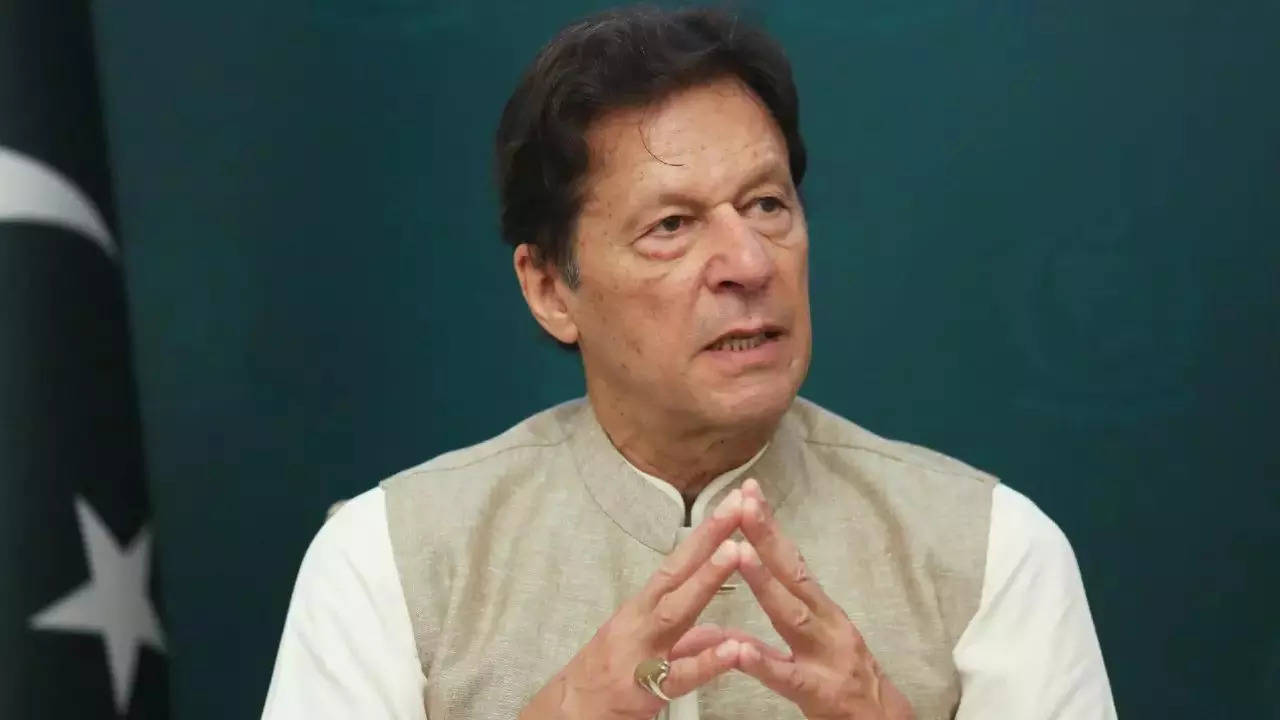Can Imran Khan, ‘Prisoner No 804’, win Pakistan elections from jail?

Pakistan is set to go to polls on February 8. Going by reports, former PM Nawaz Sharif’s PML-N is likely to win a majority or will emerge as the single largest party in the national polls. PML-N’s win is predicted largely due to the backing of the “establishment”, a euphemism for the Pakistan army. It’s the army that generally decides who will be the Pakistan PM.In Pakistan, a PM is generally selected, not elected. It’s an open secret that it was the ‘establishment’ that helped Imran Khan become Pakistan PM after the last general elections.
But, now the same ‘establishment’ has turned against Khan. Just ahead of elections, the former PM has been sentenced three times in a week. He is already barred from contesting elections and his party, Pakistan Tehreek-e-Insaf (PTI), has been denied from using its symbol ‘bat’ for elections.
Pakistan ex-PM Imran Khan, wife Bushra get 7 years jail term in ‘un-Islamic marriage’ case
Thus, it would be easy to write off the charismatic 71-year-old’s political career. But Khan won cricket matches from seemingly impossible positions as national captain, and Pakistan has seen dozens of politicians sentenced to lengthy prison terms only to see them overturned when they are back in favour.
But can the “Prisoner No 804″, Khan’s jail ID, can still do the impossible and lead his party to win in this week’s national elections? Well, he is trying.
Imran and his PTI are not giving up on his political comeback. The PTI is using a combination of technology, social media, and new candidates to mobilize his millions of supporters and defy the military-backed government.
One of the key strategies that the PTI is employing is artificial intelligence (AI) voice generation. The party is using this technology to produce Khan’s speeches from notes smuggled out of prison by his lawyers. The speeches are then broadcasted on large screens at public rallies or streamed online, giving the impression that Khan is addressing his followers from his jail cell. The party claims that this is the first time that AI voice generation is being used for political purposes in Pakistan.
Another tactic that the PTI is using is social media, especially TikTok, the popular video-sharing app. Khan has over 10 million followers on TikTok, where he posts short videos of himself or his party workers. The party is also hosting virtual rallies on TikTok, where Khan’s supporters can join live sessions and interact with him or other PTI leaders. The party says that this is a way of reaching out to the young and urban voters, who are the main base of the PTI.
“They can ban what they want, they can ban YouTube and TikTok, whatever they want but our vote is for Imran Khan,” 18-year-old Imran Aziz, a first-time voter, told AFP at a bustling electronics market in the garrison city of Rawalpindi.
The PTI is also relying on new candidates, many of them inexperienced or unknown, to contest the election. The party says that this is a result of the government’s crackdown on its workers and supporters, who have been arrested, harassed, or intimidated by the authorities. The party also says that the electoral commission’s decision to revoke its cricket bat symbol, which was associated with Khan’s former career as a cricketer, has forced it to field independent candidates with different symbols. For example, Rehena Dar, a 70-year-old woman who is running for the PTI in Sialkot, Punjab, has a baby’s cot as her symbol.
The PTI faces many obstacles and challenges in its campaign, including the censorship of its posters and banners, the lack of media coverage, and the influence of the powerful military, which controls key institutions and media outlets. The party also has to compete with the ruling Pakistan Muslim League-Nawaz (PML-N), the opposition Pakistan Peoples Party (PPP), and several smaller parties.
“They have apps, they have online speeches, they’ve done a Tiktok jalsa (gathering) which is unprecedented, at least in Pakistan, so they have a way of innovating and it’s always been the case,” Ramsha Jahangir, a technology journalist, told AFP.
But the PTI’s main strength is its appeal to the disillusioned and frustrated voters, who are fed up with the status quo and inspired by Khan’s anti-corruption and reform agenda. “In contrast to the assessment that a PML-N win is a done deal, is the view that Imran Khan’s charismatic appeal and the success with which he has mobilised the latent anti-military sentiment that paradoxically exists amongst many in Pakistan should not be underestimated and the election may still throw up a surprising result,” TCA Raghavan, former High Commissioner to Pakistan, wrote in a column in this paper.
What to watch out for
But using AI and running virtual campaigns have their limitations, especially in a country like Pakistan. “Only about 30% of Pakistan’s population are active social media users. So that suggests that as good as the PTI is at getting the word out on social media there will be inherent limits to their reach with their online campaigning,” Michael Kugelman, director of the South Asia Institute at the Wilson Centre think tank in Washington, told BBC.
Should candidates supported by PTI emerge victorious, their status as independents means they are not obligated to remain with the party and may consider aligning with different parties, especially with Khan’s continued imprisonment potentially influencing such decisions.
In the post-election landscape, the allegiance of successful independent candidates becomes pivotal for any political party aiming to gather the requisite parliamentary majority to establish a government.
(With inputs from agencies)
